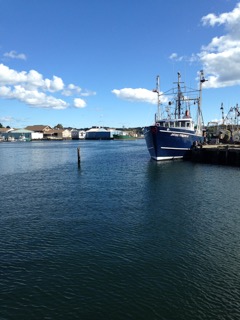Gloucester is home to a tight-knit fishing industry, a market that sustains the local economy. Defined by its history as the nation’s oldest seaport, its scenic harbor views, and a flourishing community of artists, the city is one of the North Shore’s most beloved cultural hubs.
It is also where a local seaman recently lost his life. In early December 2015, three fishermen had plans to bring in an eel haul and to return home before the forecasted inclement weather. About 18 miles off the coast of Cape Ann, the Orin C’s engine began to overheat. With engine temperatures at a dangerous high, Captain David “Heavy D” Sutherland and crew members, Travis Lane and Rick Palmer, shut off power and radioed for a tow.
When the another boat in the area, the Foxy Lady, arrived to help, the men were relieved. However, worsening weather conditions and a too-short tow line resulted in the Orin C taking on heavy swells. By the time the Coast Guard arrived to take over the tow, the ship had a leak in the bow, and the crew members where trying to dispel water. Sutherland, Palmer, and Lane chose to stay on board while the Coast Guard towed them to the nearest harbor. However, the ship was quickly surrendering to the growingly harsh seas.
Palmer, Sutherland, and Lane abandoned ship, with Palmer and Lane making it to safety. Captain Sutherland, however, didn’t. “His…head was already underwater,” Lane told the Boston Globe. “He made a few strokes and just stopped.”
A rescue swimmer pulled Sutherland onto the Coast Guard ship, but he wasn’t breathing. Because he hadn’t swallowed any water, his cause of death is unknown. On board, the Coast Guard crew performed CPR, to no avail.
According to Mark Ring, chair of the Gloucester Fisheries Commission, “There’s always plenty of risk [in the fishing industry], more so than other businesses…especially in the wintertime.” Even with all those risks, however, it is not common to lose a crewman after the Coast Guard has arrived on the scene. In the wake of this tragic event, the Coast Guard is looking to review its safety policies.
In the case of the Orin C, it is fortunate that two lives were saved. But the loss of the third is grievous. Because he was retrieved from the water so quickly, the captain would have benefitted from a defibrillator upon rescue. The lack of an onboard defibrillator signaled the need for a safety protocol review. The institution is considering requiring all ships to be equipped with defibrillators, as well as up-to-date, reliable pumps, and updated safety equipment delivery methods by helicopters to ships in need. “I think a lot of people were surprised that [the ships] aren’t equipped with defibrillators,” Ring said, “If they change that one procedure, it could make a world of difference.”

